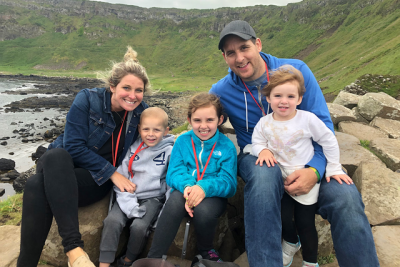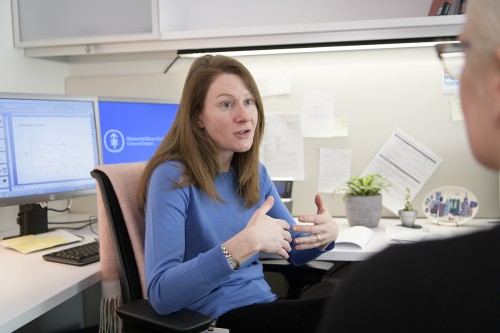Taking on Cancer before His Fifth Birthday: Thomas’s Story
Thomas Glackin was 4 years old when he was diagnosed with a rare pediatric cancer at a local hospital. His family took him to the MSK Kids team for treatment and today, he has no evidence of disease.

Caitlin and Tom Glackin, with (from left to right) Thomas, Madeline, and Reagan, took a family vacation to Ireland after Thomas finished cancer treatment.
- Thomas Glackin was 4 years old when he was diagnosed with rhabdomyosarcoma.
- After being diagnosed at a local hospital, his family took him to the MSK Kids team at Memorial Sloan Kettering.
- There, pediatric oncologist Leonard Wexler recommended chemotherapy and a form of radiation called proton therapy.
- Today, Thomas has no evidence of disease.
Caitlin Glackin of Floral Park, New York, was busy juggling nursing school and three young children. When her 4-year-old son, Thomas, started acting unusual in the summer of 2018, Caitlin took him to the doctor. A blood test didn’t reveal anything abnormal. The doctor suspected behavioral problems and also treated him for an ear infection. Weeks later, Thomas said his eye hurt, and Caitlin took him to an emergency room near their home.
Caitlin Glackin: He wouldn’t run down the block with his wagon. He didn’t want to go swimming. All he wanted was to lie on the couch and cry. When they finally did the scan of his head at the emergency room, I saw the nurse and physician assistant looking at it for a long time. I asked, “What’s going on?” They said, “We see something, but we don’t know what it is.” It was the worst night.
Thomas was admitted to the hospital overnight. When the initial test results came back days later, Caitlin and her husband were stunned to learn that Thomas had rhabdomyosarcoma, a rare pediatric cancer. It was a Thursday, and doctors told her they would know more about the extent of Thomas’s illness after the weekend, when they could get more scans.
Caitlin: Until that point, I wasn’t even thinking about cancer. I couldn’t imagine that. When they said, “We’re waiting for the full results,” I thought, So you want me to wait until Monday to see if this cancer is all over my son? My brother’s girlfriend is a doctor. She was the one who said to go to MSK.
Leonard Wexler, MSK Kids pediatric oncologist: We try very hard to get people in [for appointments] immediately. Thomas is just about the cutest little boy in the world. I remember his dad is Irish and has a lovely, lilting brogue. His mom was petrified. A lot of my job is reassuring parents that this is a treatable situation.
Caitlin: We got all the info we needed right away when we came to MSK. By the time we left, Thomas had had every scan he needed.
Dr. Wexler: Too often, when a child has a lump, they are admitted to the hospital. That’s not a good place to be unless you have to be there, especially when you’re scared. At MSK, we rarely if ever admit someone to the hospital for routine scans and tests. We know what needs to get done, and we are usually able to get it done quickly.
There are two types of rhabdomyosarcoma: embryonal and alveolar. Tests done at MSK Kids revealed that Thomas had embryonal rhabdomyosarcoma. It is the more common type. Dr. Wexler advised chemotherapy and a special form of radiation called proton therapy. Proton therapy uses charged particles to precisely target cancer cells while sparing healthy tissue.
Dr. Wexler: Adults can get this disease, but it is more commonly seen in children. There are at most 400 cases of rhabdomyosarcoma in children and teenagers per year in the United States. There are more cases of colon cancer diagnosed in a single day. That said, at MSK we see two to three dozen children with rhabdomyosarcoma a year. Many hospitals, even moderate-size ones, might see one to three a year. So, yes, this is a rare cancer, but we know what to do here.

Dr. Wexler gives Thomas a hug.
Caitlin: Dr. Wexler was optimistic the whole time. He was straightforward. He said, “This is what we’re going to do, and we’re going to take it one day at a time.” He was organized, professional, and amazing. [MSK Kids radiation oncologist] Suzanne Wolden was also unbelievable. I was worried about sagging in Thomas’s face. He’s been through enough, and now he’s got to look different too? Dr. Wolden said she would place the beam further back in his face so that if he had any drooping, it would be on the side, not the front. After that conversation, my husband and I felt so much better.
Suzanne Wolden: I’ve treated hundreds of patients with this type of tumor and have been doing research in this area for more than 20 years. When I met Thomas and his family, I wanted them to feel confident in our team’s capabilities.
Joshua Resa is a pediatric oncology fellow with MSK Kids. (Fellows are doctors are who are receiving in-depth training in a specialized area of medicine.) Dr. Resa was another important member of Thomas’s care team.
Joshua Resa: Thomas is a very cute, interactive kid. I remember his parents asked insightful questions. I was in the room when Dr. Wexler gave a clear explanation of what treatment would entail and a good overview of why we were suggesting the options we did. We recognized that Thomas’s new diagnosis was quite stressful for the family, so we encouraged them to reach out to us with any questions first rather than go straight to the Internet. What someone reads online can often be inaccurate or not applicable to a particular person. I felt that we were able to reassure them about the expected complications with a very good shared understanding of Thomas’s treatment.
Caitlin: They put Thomas on a higher dose of chemotherapy than what was standard. It gave his disease a one in ten chance of returning instead of a four in ten chance, like lower-dose plans would.
Dr. Wexler: Research done at MSK Kids demonstrates that more intensive doses of chemotherapy are tied to much better outcomes for children with tumors in this part of the body. We felt comfortable telling the family that although there were potentially more side effects, we thought it was in Thomas’s benefit.
Chemotherapy can cause infertility. Thomas had a surgical procedure to preserve tissue from his testes as a precaution.
Caitlin: That’s an amazing thing that MSK Kids is able to do.

Thomas had five cycles of chemotherapy. His follow-up scans showed an excellent response. Then, he had 28 radiation treatments, with two additional cycles of chemotherapy at the same time. After that, he received an additional five cycles of chemotherapy, though at lower doses. He had some immediate side effects, including hair loss. He also had to be hospitalized when his blood count dropped and he spiked a fever. However, Thomas’s care team was able to manage these side effects, and Thomas was able to complete his treatment.
Caitlin: Dr. Wexler was amazing throughout the whole process. He’s the kindest, most soft-spoken, caring person, and he really loves Thomas. He made him feel special. Thomas loves sharks, and one day we were there for a visit, Dr. Wexler came in dressed like a shark. Thomas loved it. You know you’re getting the best and everybody truly cares for you at MSK. Everybody was saying, “Hey, Thomas! What’s up?” and giving him high fives. His teacher, Anne Marie Cicciu, took such good care of him.
Thomas had his chemotherapy port taken out on his fifth birthday. He has no evidence of disease and will continue to see his care team for follow-up appointments.
Dr. Resa: The highest risk of the disease coming back is in the first couple of years. We recently had his end-of-treatment discussion.
Dr. Wexler: It’s so important to have that end-of-treatment debriefing so we can answer questions the family had when they didn’t have time to think. We’re going to see him every three months. It’s overwhelmingly likely he’s going to be just fine.
Caitlin: We had a huge party for his birthday. He had his face painted and had the best day. It turned out that one of the magicians we hired had had cancer too, so he and Thomas bonded. And we ended up meeting another person who had the same type of cancer Thomas had, and he’s five or six years out from treatment.
The Glackins are starting to return to their normal family life. They are taking vacations and enjoying life outside of the hospital. Thomas isn’t the only one headed to school: Caitlin will return to her nursing program after taking time off to care for Thomas. Coincidentally, some of her classmates were doing clinical rotations at MSK Kids while Thomas was being treated.
Dr. Wexler: What I want is for Thomas to have the best possible life he can. I fully expect he will remain as adorable as a teenager as he is now.
Dr. Resa: MSK Kids holds a graduation every year for children treated here who are graduating from high school. We’re hoping to see Thomas back for that, still as happy, cute, healthy, and vigorous as he’s always been.
Dr. Wexler: The side effects of treatment can take a long time to measure, and we hope that he will be left with healthy emotions as well as a healthy body. This is a searing trauma. You don’t simply turn around and walk away from it. I don’t know if you can have the same life after going through this, and I don’t know if you should. For a family to be confronted with something most families don’t even know about, you hope that in some way it gives them a different perspective on the beauty and fragility of life.
Caitlin: It was such a dark time in our lives, and it’s still scary, but everybody at MSK Kids was amazing. Anything we needed, any questions we had, everybody was so understanding. You never felt like you were alone.





